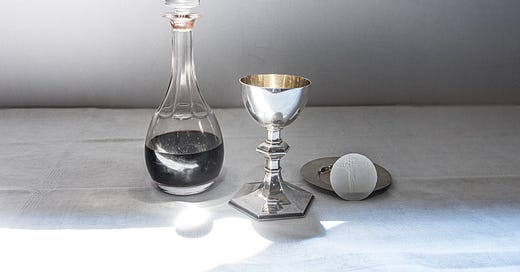Today, we talk about the most important difference between Catholicism and Protestantism. No, it’s not fealty to the pope…
Or the Magisterium…
Or even devotion to Mary…
Which is not to say those things aren’t important. But the reason we go to mass every Sunday1 isn’t just to hear the readings or sing along with the choir. It’s to receive the body and blood of Christ.
Okay, just one more meme—
Reading 1
Dt 8:2-3, 14b-16a
Moses said to the people: "Remember how for forty years now the LORD, your God, has directed all your journeying in the desert, so as to test you by affliction and find out whether or not it was your intention to keep his commandments. He therefore let you be afflicted with hunger, and then fed you with manna, a food unknown to you and your fathers, in order to show you that not by bread alone does one live, but by every word that comes forth from the mouth of the LORD.
"Do not forget the LORD, your God, who brought you out of the land of Egypt, that place of slavery; who guided you through the vast and terrible desert with its saraph serpents and scorpions, its parched and waterless ground; who brought forth water for you from the flinty rock and fed you in the desert with manna, a food unknown to your fathers."
This is one of those “The New Testament lies hidden in the Old and the Old Testament is unveiled in the New” situations. God sent down bread from heaven, so the Israelites wouldn’t die from starvation.
Which is great and all, but Jesus promises even more. His bread is the bread of eternal life.
It’s worth noting we don’t go to church, grab communion, and take off. Because we do not live by bread alone, but by “every word that comes forth from the mouth of the Lord.” And so we also have the liturgy of the Word at the start of each mass, too.
Responsorial Psalm
Ps 147:12-13, 14-15, 19-20
R. Praise the Lord, Jerusalem.
Glorify the LORD, O Jerusalem;
praise your God, O Zion.
For he has strengthened the bars of your gates;
he has blessed your children within you.
R. Praise the Lord, Jerusalem.
He has granted peace in your borders;
with the best of wheat he fills you.
He sends forth his command to the earth;
swiftly runs his word!
R. Praise the Lord, Jerusalem.
He has proclaimed his word to Jacob,
his statutes and his ordinances to Israel.
He has not done thus for any other nation;
his ordinances he has not made known to them. Alleluia.
R. Praise the Lord, Jerusalem.
God started with Israel, teaching them his ordinances and commands. But it was never meant to stop there; God wanted His word to spread. Jesus began there, but His word was often rejected, and He left it to the apostles to spread it everywhere.
Reading 2
1 Cor 10:16-17
Brothers and sisters: The cup of blessing that we bless, is it not a participation in the blood of Christ? The bread that we break, is it not a participation in the body of Christ? Because the loaf of bread is one, we, though many, are one body, for we all partake of the one loaf.
The Eucharist is celebrated every day, virtually at all times at some place on Earth. But it’s also heaven, which is why we sing with all the angels and saints. The Eucharist is the same Eucharist across all time and space, which is why we can say it truly is Christ’s body.
Alleluia
Jn 6:51
R. Alleluia, alleluia.
I am the living bread that came down from heaven, says the Lord;
whoever eats this bread will live forever.
R. Alleluia, alleluia.
***
Gospel
Jn 6:51-58
Jesus said to the Jewish crowds: "I am the living bread that came down from heaven; whoever eats this bread will live forever; and the bread that I will give is my flesh for the life of the world."
The Jews quarreled among themselves, saying, "How can this man give us his flesh to eat?"
Jesus said to them, "Amen, amen, I say to you, unless you eat the flesh of the Son of Man and drink his blood, you do not have life within you. Whoever eats my flesh and drinks my blood has eternal life, and I will raise him on the last day. For my flesh is true food, and my blood is true drink. Whoever eats my flesh and drinks my blood remains in me and I in him. Just as the living Father sent me and I have life because of the Father, so also the one who feeds on me will have life because of me. This is the bread that came down from heaven. Unlike your ancestors who ate and still died, whoever eats this bread will live forever."
This was a very off-putting statement from Jesus. He regularly spoke in parables and metaphors, and then later explained them, to either his apostles or the disciples generally. He never clarifies or modifies these statements about eating His flesh, however.
In fact, He doubles down, using the Greek word τρώγω. Which we translate as “eat,” but is more like “munch” or “gnaw,” to make sure we understand that He really means eat in a literal sense.
So, that’s what we do. The Eucharist Minister says, “The body of Christ,” and we respond, “Amen”—we believe.
Or more, if you can.









Good way to explain the reasons for many things.